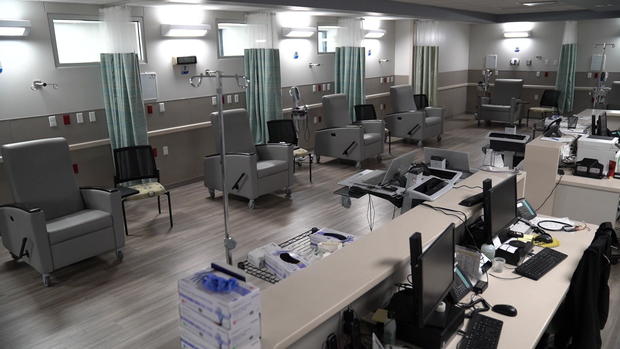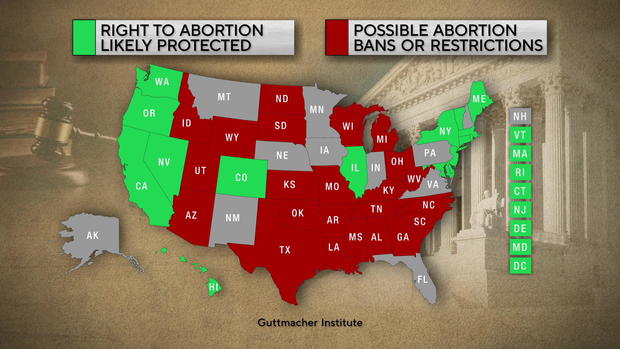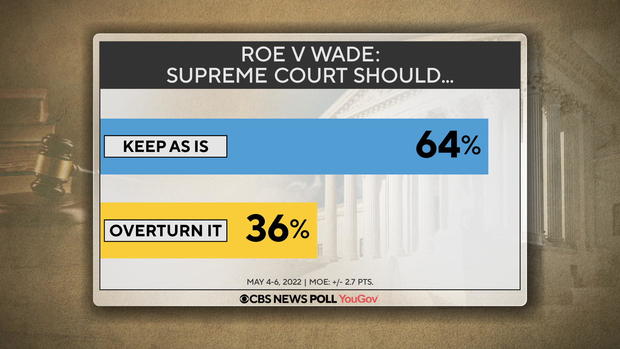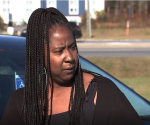A frontline in the fight over abortion
[ad_1]
Never mind that Justice Samuel Alito’s leaked opinion that would overturn Roe v. Wade was a draft, not a final decision; its impact was like a hurled grenade. Once detonated, it ignited all the pent-up passions surrounding the expected end of Roe, after nearly 50 years. The news was a shock, but not a surprise.
“In 2019 we got a preview and a dry run of what living in a post-Roe reality was gonna look like,” said Yamelsie Rodriguez, president and CEO of Planned Parenthood for the St. Louis Region and Southwest Missouri.
In May 2019, only last-minute court intervention kept the Planned Parenthood facility in St. Louis open. It was the last abortion clinic in the state. “And it was at that moment that we started to be really strategic for planning for a future without abortion in the state of Missouri,” Rodriguez told correspondent Martha Teichner.
Planned Parenthood built an 18,000-square-foot facility, in secret, in Fairview Heights, just across the Mississippi River from St. Louis, in Illinois – where abortion laws are as liberal as they are restrictive in Missouri. Last year it performed approximately 6,000 abortions. It is prepared to perform 14,000 a year going forward.
Rodriguez said, “We are doing this not just for Missouri patients, but for patients across the Midwest and South.”
CBS News
If you want to see what a post-Roe world will look like, look at a map of the states, like Illinois, where abortion will be legal … and all those others where it likely will not: A new kind of continental divide.
CBS News
In January, the Fairview Heights clinic opened this first-in-the-nation Regional Logistics Center. It provides patients money, transportation, lodging, whatever they say they need, wherever they are.
Teichner asked Kawanna Shannon, who runs the center, “I’m sure there are anti-abortion supporters who will say, ‘Oh, you’re sitting there all day, every day, facilitating people killing their babies’?”
“I will tell you that I am sitting here every day facilitating a person’s right to choose what they want to do with their body,” Shannon replied.
Equally passionate, but on the opposite side, is Missouri State Representative Mary Elizabeth Coleman, who told Teichner, “I dreamed of being a mom. And when I learned that some children don’t even have the right to live, it just shocked my conscience. It still does.”
Coleman is elated at what appears to be the Supreme Court’s decision: “It seems like an incredible victory for the American experiment, in my mind. We have a decision that 50 years ago was wrongly held. And the conservative pro-life movement has been working within the system to change that bad law since it was passed.”
A mother of six and a lawyer, Coleman is the face of her state’s waiting-in-the wings law banning abortion. If Roe does get overturned, Coleman said, “Abortion will be illegal in the state of Missouri except for the life of the mother.”
Coleman has proposed legislation that goes further, targeting not the woman herself, but any professional service provider, anywhere, who knowingly aids or abets someone from Missouri getting an abortion – exactly the sort of services the Fairview Heights facility provides.
Coleman said, “I don’t think if you live in Missouri or if you live in New York, your value as a person is any less. So, I’d like to see us continue to try to fight this at a national level as well.”
According to a CBS News poll out today, more than 6 out of 10 Americans want Roe left in place.
CBS News
But if it does fall, as expected? The battle over abortion shifts from the courts to the legislative arena at all levels of government – and both sides agree on this one thing, as Yamelsie Rodriguez said: “Right now vote, because your life and your future actually depends on it.”
See also:
For more info:
Story produced by Sari Aviv and Michelle Kessel. Editor: Chad Cardin.
[ad_2]
Source link













